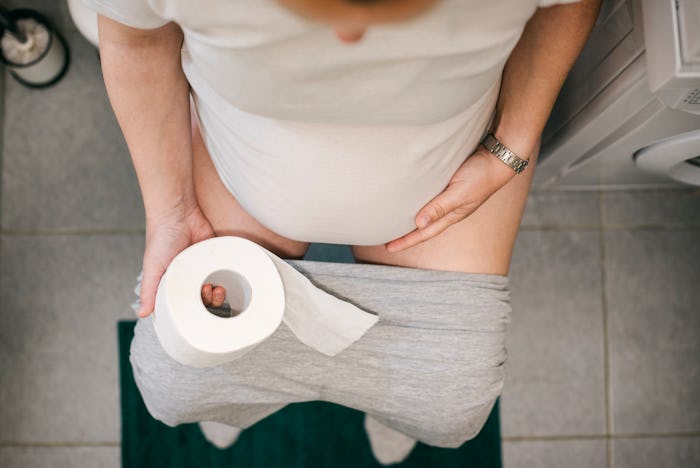Postpartum

Pooping After A C-Section Can Be Scary, But It Doesn’t Have To Be
Two words: stool softeners.
If you thought delivering your beautiful baby was going to be hard, wait until you have to produce your first postpartum poop. Although having a bowel movement after baby is born is challenging whether you’ve had a vaginal birth or a cesarean section, there’s something about a C-section poop that can be even more complicated because, well, pain. Pooping after a C-section isn’t easy, but it will be such a relief when it’s over — literally.
Why is pooping after a C-section so scary?
If you’re afraid to toot, let alone poop after a C-section, you’re not alone. “Pooping after a C- section is definitely more painful,” Dr. Greg Marchand, M.D., an OB-GYN tells Romper. “The whole C-section is more painful and requires more recovery, since it’s a major abdominal surgery.” Think about it: When you make a solid bowel movement, you have to engage the muscles in your abdominal area to push.
So when do you poop after a C-section?
Everybody’s body (and bowels) are different, so there’s no set rule on when you might feel the urge to go number two. “People think they need to poop right away, and it’s not the case,” explains Dr. Cheruba Prabakar, M.D., an OB-GYN. “If you have a planned C-section, you can’t eat for eight hours prior, so you don’t have anything in your system, anyway.” But even if you have an emergency C-section, chances are that you still might not have been eating much during labor, so there won’t be much to poop out.
Don’t expect it to happen right away though because you need to let your bowels recover from the procedure as well. “It can take some time before the bowels wake up again... due to anesthesia and being manipulated during the surgery, they can go to sleep for a while.” While sleepy bowels might not seem like a bother, gas can form and build up during that time period, making normal bodily functions like passing gas or pooping that much more challenging.
As for the exact timeline when you’ll actually poop for the first time after a C-section, “It can a few days to a week to have your first bowel movement after a cesarean section,” says Dr. Megan Gray, M.D., an OB-GYN at Orlando Health Physician Associates. “Several things affect gastric motility including certain types of anesthesia, the surgical procedure itself, certain post-operative pain medications, and reduced mobility, which leads to slowing of the bowels.”
How can you make pooping easier after a C-section?
If you’re fearful about fecal matters, stool softeners are about to become your BFF. “Start stool softeners right away, twice a day,” recommends Prabakar. “You can start taking them immediately on day one.” Other ways to get things moving again is by moving yourself, since studies show that staying active can activate your bowels, and to stay hydrated.
Is there a possibility of popping the stitches if you poop too hard?
For some women, the idea of pooping is scary because they’re fearful all that pushing will pop their stitches. But is this a real possibility? Not necessarily, says Gray. “No, you are not going to be able to increase your intraabdominal pressure enough by bearing down to have a bowel movement to affect your stitches (unless a defect in the stitches already exists, which is rare),” she says. Prabakar adds: “You can’t pop the stitches; the sutures are pretty durable.” That said, you don’t want to bear down too hard while you’re trying to have a bowel movement, since it can cause additional pain and pressure in your abdomen, which is something you want to avoid.
When should there be a concern about pooping after a C-section?
Although pooping shouldn’t be your primary focus in those first few days after your baby is born, you still should be aware if something is preventing you from pooping. “There’s a bigger concern if a week has gone by and you still haven’t pooped, because constipation can be painful,” says Marchand. “If your bowels are not waking up, and you’re experiencing pain or a fever, it could be signs of a complication and you should speak to your doctor.”
Other signs that something is off is if you’re experiencing nausea or vomiting, adds Prabakar. But before you panic about pooping, keep your medical history in mind, advises Gray, who says: “Most people will have a bowel movement within 5-7 days after a cesarean section, unless they have a history of chronic constipation or bowel dysfunction diagnosis (Crohns, IBS, or IBD).”
Although pooping after a C-section might not be something you’re looking forward to, it shouldn’t fill you with fear, either. Simply stock up on stool softeners (if your doctor recommends it), stay hydrated, and keep moving. Before you know it, you’ll be very proud of the first postpartum poop that your body produces.
Study cited:
Schryver, A., Keulemans, Y., Peters, H., Akkermans, L., Smout, A., Vries, W., Berge-Henegouwen, G. “Effects of regular physical activity on defecation pattern in middle-aged patients complaining of chronic constipation” 2005.
Experts:
Dr. Greg Marchand, M.D., an OB-GYN
Dr. Cheruba Prabakar, M.D., an OB-GYN
Dr. Megan Gray, M.D., an OB-GYN
This article was originally published on